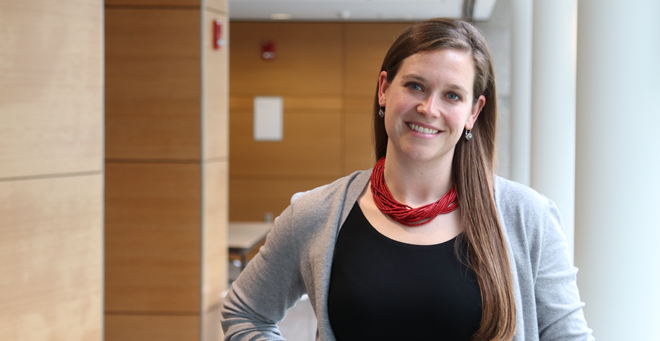 |
|
|
Amelia Nelson, MS, FNP |
Amelia Nelson, MS, FNP, is the kind of person who runs toward the fire, not away from it, or in the case of the 2013 Boston Marathon bombing, toward critically injured victims. The explosion went off just yards from where Nelson, a nurse practitioner and the 2018 Graduate School of Nursing Commencement class speaker, was stationed as a sweep nurse near the finish line. Her onsite triage preceded hours of caring for bomb survivors at the emergency department at Beth Israel Deaconess Medical Center, where she worked.
An advanced nursing practice scholar; skilled emergency, trauma and disaster care provider; athlete; and adventurer, Nelson will mark the next milestone in her career when she is hooded as a Doctor of Nursing Practice on Sunday, June 3. Already a UMMS alumna, Nelson earned her Master of Nursing in the Family Nurse Practitioner track in 2016 before deciding to continue in the doctoral program.
“I always knew I wanted to go back to school for my master’s, but didn’t know I wanted a doctorate until I had gotten to the point where I wanted to know more—I needed to know more to be better at this,” said Nelson. “My incredible ER experience gave me a lot of knowledge but I didn’t necessarily have all of the science behind it, and I yearned for that.”
After completing a Bachelor of Nursing at George Mason University in 2008, the Milton native spent several years as an emergency room nurse before returning to graduate school in 2014. Work as a traveling nurse and volunteer on international health missions took her far and wide.
“The travel nursing allowed me to see different systems and how they function,” she said. “But returning on multiple travel assignments to Washington Hospital Center in D.C., I realized that the types of diseases and populations I encountered in an American city were not all that different from some of the diseases and population and struggles I saw in Haiti, so I decided I needed to do more here.”
Following the marathon bombing, Nelson was one of the first nurses invited to join the Disaster Medicine fellowship at Beth Israel. “I was introduced to the academics of disaster and humanitarian aid, which further triggered my interest in doctoral work to learn more about the systems, business and logistics of health care.”
She has already delved into health care policy and leadership with her doctoral training. Under the mentorship of Kenneth Peterson, PhD, assistant professor of nursing, she conducted a policy analysis of health care delivery for her scholarly doctoral project. She looked at high rates of observation stays versus inpatient admissions in a community hospital.
Medicare and most private insurers require a three-night hospital stay for inpatient vs. observation coverage. If they are observed but not admitted, Medicare patients have a 20 percent copay and are fully responsible for medications during the hospital stay, so they often go home with a bill and are further denied a skilled nursing benefit.
“It’s about making sure that you’re applying the regulations appropriately so that we don’t have patients not getting the care that they need,” Nelson explained. “If we have patients in the hospital who warrant inpatient admission, they need to be designated correctly so that the hospital gets the appropriate reimbursement and the patient doesn’t go home with a bill.
“I love logistics and tinkering. It was exceptional to have [Ken] as a mentor guiding me through this process, which was somewhat unfamiliar coming from the clinical side of things, being able to look at a problem from many different angles to see what kind of interventions could help shift or change the way a policy is applied to achieve the three tenets of health care policy: access, cost and quality.”
Following graduation, Nelson will continue providing clinical care as an emergency nurse practitioner.
“I have a lot to learn, am enjoying my practice and want to continue providing direct care to patients. The skills I’ve learned in my doctorate absolutely make me a better provider,” she said. “I hope to use the leadership skills I’ve gained to eventually work in management, logistics and population health. I’ve already started to work on process improvement.”
In September, Nelson is marrying a fellow UMass Medical School alum. She and Jonathan Nadler, MD, SOM ’13, met at Beth Israel Deaconess Medical Center during his emergency medicine residency. They will continue to live in the Boston area, where Nelson works at Winchester Hospital and Dr. Nadler works at Cambridge Health Alliance.